COLUMN: Returning early from a LDS mission
An exciting event for many young Latter-day Saints is receiving their mission calls. Many members of The Church of Jesus Christ of Latter-day Saints, previously known as the Mormon Church, serve mission trips to proselytize and do service for their church around the world. Being raised in a Latter-day Saint family, I felt the desire to go and submitted my mission papers at 19 years old. In 2018, I opened my mission call to Sweden. It was a dream come true.
My initial excitement about the mission dissolved as soon as I entered the mission field. While I had had a testimony of my religious views at the time, I quickly realized the mission demanded a level of belief more than just mere faith. I could not meet the demands of the mission honestly, so I decided to return home after a few months.
I did not realize how coming home would be viewed by my extended community. I was used to the words of the LDS leader, Elder Holland, who remarked “when someone asks you if you’ve served a mission, you say yes. You do not need to follow that up with, “but it was only four months.”
I thought members of my religious community would understand my faith struggles and appreciate my efforts for attempting to serve my community. Yet, the response I received from my Utah tribe was totally different.
It is painful to see an organization and a tribe you have supported for years seemingly reject you for being honest with yourself.
When I returned to Utah, I saw members of my old church unit in the hallways. While I was a little bashful to encounter them, I was shocked by the cold glances and looks of disdain I received. People considered my decision to come home as an attack and total rejection of my LDS identity. While I still deeply valued many aspects of my LDS upbringing, people started to assume the worst about my behavior.
I remember one member of the church who after hearing I came home asked me, “Does this mean you’re going to start drinking alcohol now?”
While the people who really mattered in my life accepted me for who I was, I was astounded by this response from the LDS public at large.
From speaking to others who have gone through similar experiences, I do not think my experience is an anomaly or unique to me.
Being raised a Latter-day Saint can be an incredibly demanding social environment. It is often cited Utah has the 5th highest suicide rate in the country. One recent study shows a correlation between teen suicide and LDS populations. Therefore, it is absolutely crucial we understand Utah’s situation from a secular point of view and work to solve these mental health issues. These are tough issues beyond the scope of this article, but for those undergoing similar challenges pertaining to tribal rejection, I can share my own experience.
We all have a deep need for belonging and participation in a collective identity. Sometimes, that identity begins to erode or evolve and it can feel like one’s world is falling apart.
But a new perspective helped me cope with Utah’s strange sociological environment.
While I was initially disheartened by the betrayal and rejection of my previous friends, when I had a shift in perspective, I realized it was actually incredibly liberating.
Every so often, a forest must have a fire so the accumulated deadwood burns away. When I came home early from my mission, all the relationships based on nothing more than mutual adherence to the church’s tradition burned away and I learned who my real friends were.
I learned to be independently satisfied with who I am, despite what others might think. I learned the definition of empowerment.
As more and more young men and women return home early from their missions, I hope my story can offer some solace to those in similar situations. Because, despite how it might seem and how people react to your decision, your personal identity is still yours and yours alone.
—kfors@gmail.com

